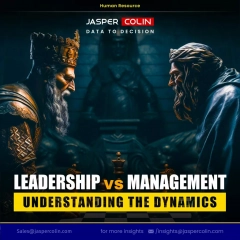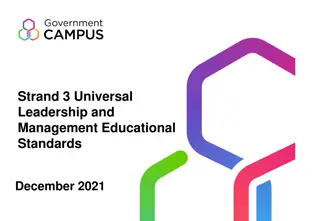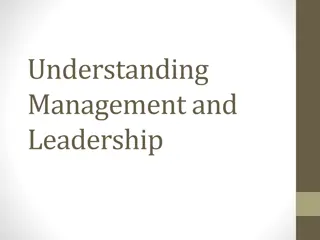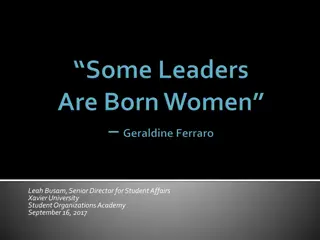Contrasting Management and Leadership in Educational Context
Understanding the distinction between management and leadership is crucial in educational settings. While management focuses on planning and coordination, leadership inspires and motivates. This article discusses the differences between the two roles, highlighting Warren Bennis' insights and the ongoing debate about leadership and management in academia.
Download Presentation

Please find below an Image/Link to download the presentation.
The content on the website is provided AS IS for your information and personal use only. It may not be sold, licensed, or shared on other websites without obtaining consent from the author. Download presentation by click this link. If you encounter any issues during the download, it is possible that the publisher has removed the file from their server.
E N D
Presentation Transcript
TEACHER`S PERSONALITY IN EDUCATIONAL MANAGEMENT AND LEADERSHIP IN EUROPEAN SOCIETY Prof. Svitlana Shekhavtsova Doctor of Pedagogical Sciences, Faculty of Arts, Department of Slavic Languages Matej Bel University in Banska Bystrica Slovakia E-mail: shekhavtsova1@gmail.com
DIFFERENCE BETWEEN MANAGEMENT AND LEADERSHIP Leadership and management must go hand in hand. They are not the same thing. The manager s job is to plan, organize and coordinate. The leader s job is to inspire and motivate
In1989 Warren Bennis in his book On Becoming a Leader the manager administers; the manager is a copy; the manager maintains; the manager focuses on systems and structure; the manager relies on control; the manager has a short-range view; the manager asks how and when; the manager has an eye on the bottom line; the manager imitates; the manager accepts the status quo; the manager is the classic good soldier; the manager does things right. the leader innovates; the leader is an original; the leader develops; the leader focuses on people; the leader inspires trust; the leader has a long-range perspective; the leader asks what and why the leader s eye is on the horizon of the company; the leader originates; the leader challenges it; the leader is of his or her own person; the leader does the right thing.
Difference between Management and Leadership One may assume that all managers are leaders, but that is not correct since some of the managers do not exercise leadership, and some people lead without having any management positions. Therefore, there is a continuing controversy about the difference between leaders and managers.
DIFFERENCE BETWEEN MANAGEMENT AND LEADERSHIP Leadership and management - activities or functions. Both leaders and managers share some similarities because they influence others by using specific powers to achieve certain goals, there are also some prominent differences (Northouse, 2007).
PECULIARITIES OF MANAGEMENT. Management in general is a process that is used to achieve organizational goals. Certain conditions are important for creating good management such as: - managers and team members need to be selected on merit; - managers need to earn the respect of their staff, patients and supervisors; - managers need to have the knowledge, skills and understanding of the role, tasks and purpose of the services they deliver; - basic support systems function well; clear staff administration rules and regulations; well planned and timely delivered supplies, equipment; clear and transparent financial processes; and well planned and monitored activities.
PECULIARITIES OF LEADERSHIP. The author Definitions DePree, 1989 a behavior; a style; a skill; a process; a responsibility; an experience; the capacity for collective action to vitalize ; Kotter, 1990 Bennis and Nanus, 1997 a leadership as people who serve others, while they follow them; House and Aditya, 1997 a leadership is a form of the social influence processes; Maxwell, 1998 a leadership by influence; Drucker, 1999 a leader is someone who has followers;
Leaders in Education should have some critical qualities such as: integrity; vision; toughness; decisive; trust; commitment; selflessness, creativity; risk taking; toughness; communication ability; visibility (Capowski, 1994)
An effective leader in education depends upon common behaviors and characteristics like: confidence; service mentality; good coaching skills; reliability; expertise; responsibility; good listening skills being visionary; realistic; good sense of priorities; honesty; willingness to share; strong self esteem; technical or contextual, and recognition
MANAGEMENT VS LEADERSHIP IN EDUCATION Leadership and management overlap, but they are not the same; Both leadership and management involve influence, working with people, and working to achieve common goals; Leadership is a multi-directional influence relation, while management is a unidirectional authority relationship; Leaders promoter change, new approaches, and work to understand people s beliefs to gain their commitment, managers promoter stability, exercise authority, and work to get things accomplished.
WATSON MENTIONED THAT 7S STRATEGY WHICH INCLUDE: 1) strategy 2) structure 3) systems 4) shared values 5) skills 6) style 7) strategic motivation.
LEADERS DO THE RIGHT THINGS; MANAGERS DO THINGS RIGHT The manager is: 1) deliberate 2) authoritative 3) consulting 4) analytical 5) stabilizing 6) Rational 7) mind 8) persistence
LEADERS DO THE RIGHT THINGS; MANAGERS DO THINGS RIGHT Managers focus on structural, tools, and work related processes; Leaders involved in the professional work, social and communicative aspects.























